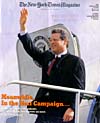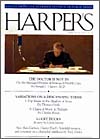
Economist, Feb. 21
(posted Saturday, Feb. 21)
The cover editorial warns of imminent violent revolution in Indonesia. The Economist hopes for President Suharto's ouster and urges the International Monetary Fund to withhold support if Suharto carries through with his own self-serving economic plan. ... An article casts doubt on British tycoon Richard Branson's foray into the railroad business. Branson hopes to exploit Britain's rail privatization with the strength of his Virgin brand. So far, his handful of rail routes are losing money, and he hasn't made the trains run on time (literally). ... A study explains why humans can't grow back missing body parts: Regeneration (in amphibians) requires tumorlike growth. We traded in this ability for a complex immune system that can fight tumors.

New Republic, March 9
(posted Friday, Feb. 20)
A five-story cover package gauges the impact of the Asian crisis. An article warns Americans not to gloat over Japan's economic woes: We need a strong Japan to keep the world economy stable. An essay argues that the IMF should save ailing countries from short-term disaster but not dictate long-term economic policy, as it has in Asia. And a story rejects the conventional wisdom that prosperity leads to democratization. In East Asia, democratization will have to come from the newly poor middle class. ... The editorial says Secret Service agents should not be forced to testify against the president, as this would 1) destroy what little privacy the first family has left; 2) reduce agents' effectiveness as the president seeks to evade their gaze; and 3) necessitate a tightknit, loyal presidential entourage, like that of a dictator.

New York Times Magazine, Feb. 22
(posted Thursday, Feb. 19)
The cover piece rates Al Gore as he prepares his 2000 presidential campaign. Gore's pluses: 1) Post-Lewinsky, his boring personal life is his best asset. 2) He's made loads of influential friends (Sen. Tom Harkin, Jesse Jackson, Colin Powell). 3) Clinton's 100-percent behind him. Gore's minuses: 1) He's still wooden. 2) Except for Bush, no sitting veep has won since 1836. 3) Clinton's 100-percent behind him. ... An article longs for the bygone days of rock "concept" albums. What happened? CD players: They let fans program the track sequence, wrecking album continuity.

Harper's, March 1998
(posted Thursday, Feb. 19)
An article derides the lack of "authentic" pop-music acts. To succeed, rock bands now either 1) fake an earnest devotion to kitschy music, or 2) earnestly devote themselves to inauthentic, radio-friendly music. ... The cover story repeats the usual criticisms of managed care: HMOs are rewarded for choosing the cheapest treatment over the best one and denying membership to unhealthy patients. Solution: Remove the profit motive from medicine. ... From the "Index": "Percentage of American men under the age of 50 who own a pair of Dockers Khakis: 72."

Time and Newsweek, Feb. 23
(posted Tuesday, Feb. 17)
Newsweek, which took a Lewinsky vacation last week, returns with a cover story about Monica and her mom. According to Newsweek, Marcia Lewis and her daughter shared secrets and a passion for powerful men. Newsweek excerpts Lewinsky's e-mails to Linda Tripp: Monica wonders why "the big creep" didn't call on Valentine's Day. After three consecutive Monica covers, Time cuts its scandal coverage drastically, limiting itself to a short piece on Lewis; an update on the Paula Jones trial; and a sidebar on Rep. Henry Hyde, R-Ill., chairman of the House Judiciary Committee.
Time's cover story on the Hong Kong bird flu warns that a worldwide epidemic is still possible. Scientists note that the 1918 flu, which killed more than 20 million people, also came from birds and started slowly before spreading around the globe. ...Time publishes a comprehensive map of how we'd attack Iraq. (The first wave will be cruise-missile strikes on radar and communications centers. Then we'll send the heavy bombers.) Like U.S. News (see below), Time thinks air strikes can't kill Saddam.
Newsweek explains the Titanic phenomenon: Women love Leonardo di Caprio and the strong, liberated heroine; guys like the action and the idea of gentlemen going down with the ship.

U.S. News & World Report, Feb. 23
(posted Tuesday, Feb. 17)
The cover story points out: 1) Killing Saddam would require a two- to three-month troop buildup and massive ground invasion. 2) We tried to kill him in '91 and couldn't. 3) Assassination is illegal under an executive order. ... An article explains where to find privacy in the Oval Office. Peepholes look in on the office so staffers can know when meetings are ending, but the peeper can't view the whole room. Clinton's adjacent study has no peephole, and a secret tunnel underneath the Oval Office could be used for a rendezvous. ...U.S. News decides the only real Monica story is how the scandal affects Wall Street. Answer: It doesn't, since economic policy won't change even with an impeachment. The millennium bug, on the other hand, might cause a big crash.

The New Yorker, Feb. 23 & March 2
(posted Tuesday, Feb. 17)
The New Yorker honors California with a special issue. The tone: triumphalism. A piece celebrates the California economy, whose two hot industries, high-tech and entertainment, show no signs of cooling off. The secret to Hollywood and Silicon Valley's success? Lots of immigrants and very flexible, "network-based" economies. ... The magazine examines Interval Research Corp., the secret high-tech think tank funded by Paul Allen. Its scientists have made computers that imitate touch and sense emotion in human voices. (For Slate's take on Interval, see Michael Lewis' "Millionerds.") ... A writer describes her ridiculous life as a B-movie star in the '70s. Among her "starring" roles: a victim in a Mexican version of Jaws and an alien disguised as an Avon Lady. She also had a date with Cary Grant, stripped for Playboy, and refused cocaine from a Rolling Stone. ... A profile of movie/music/gay-rights titan David Geffen calls him the "most powerful man in Hollywood," but notes that he's too cool and distant to be very happy. ... The issue manages to tear itself away from the lives of the rich and famous only once: An article chronicles the miserable lives of California's "ghosts," the Mexican illegals who live in shacks outside San Diego. Backbreaking labor and evading the Border Patrol are their two main activities. The ravine where they live is named, appropriately, "Los Olvidados"--"the forgotten ones."

Weekly Standard, Feb. 23
(posted Tuesday, Feb. 17)
The cover story slams White House aide Sidney Blumenthal. Once a journalist with incestuously tight ties to the Clinton administration, Blumenthal is now in the administration and stoking Hillary's claims of a "right-wing conspiracy." ... An essay contrasts Bill Clinton with Alexander Hamilton. Hamilton admitted to adultery, proving his essential honesty, and maintained his political popularity; Clinton, however, is a baldfaced liar. ... An article says women are the new locker-room braggarts. The Monica scandal has brought out sexually explicit crassness in female writers (Katie Roiphe, Erica Jong) that puts even the lewdest men to shame. Women can still get away with it. Men can't.
--Seth Stevenson
